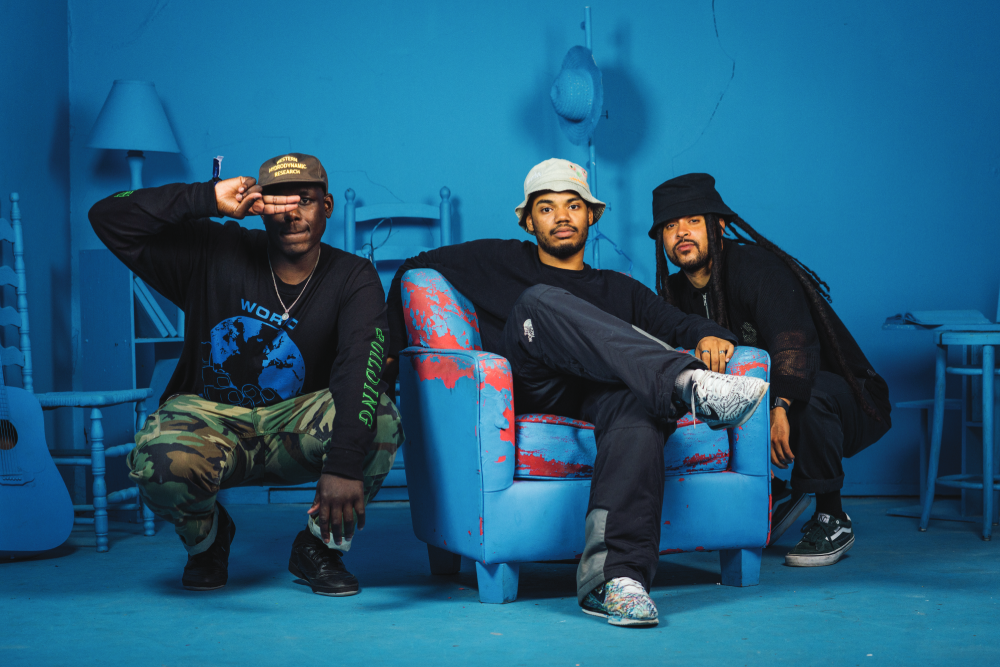Music
 L to R. Black Rave Culture’s James Bangura, Amal + Nativesun. Photo by Matt Lief Anderson.
L to R. Black Rave Culture’s James Bangura, Amal + Nativesun. Photo by Matt Lief Anderson.
Black Dance Culture Is Inclusive Power
November 1, 2022 @ 12:00pm
If you are a house or techno fan in D.C., chances are you’ve heard of Black Rave Culture, a trio of DJs and producers — Amal, Nativesun and James Bangura — creating innovative, genre-blending music that is impossible not to dance to. Or perhaps you’ve stumbled upon Black Techno Matters’ free dance parties in Malcolm X Park where guest DJs play hypnotic tunes in the middle of nature to the delight of everyone around.
These artists are creating inclusive spaces for people to come together and enjoy electronic dance music (EDM) by actively celebrating and amplifying EDM’s Black and queer influence and origins. EDM was birthed by Black people. House music was created in Chicago in the late ’70s, techno in Detroit in the early ’80s and from there, many subgenres emerged. However, considering the artists who get top billing at shows and festivals, the lineup hardly reflects the genre’s rich multicultural history. What can we as consumers of culture in the city do to change that?
We talked with Bernard (also known as Outputmessage and currently, B_X_R_N_X_R_D) of Black Techno Matters and Amal, Nativesun and James Bangura of Black Rave Culture to get their takes on D.C.’s club scene, and how they’re helping shift the perception of how local dance looks and sounds.
District Fray: How would you describe D.C.’s dance scene?
Amal: I think we [Black Rave Culture] have brought more people in who aren’t necessarily into dance music and opened up a [new] world for them. There’s the whole stigma [around] the dance scene: People automatically think of EDM, especially in D.C. because that’s the commercial scene. So when people experience our kind of sets, it changes their minds. We’re starting to see the audience grow. It’s definitely different than it was just last year.
Bangura: There are people trying their hardest to bring underground music to the forefront. DJs and groups like 140 Plus and Friends With Benefits DC bring in underground acts, as well as Black Techno Matters. Hast du Feuer are the new kids who are motivated and inspired and want to participate in the dance community here in a healthy way. And then you’ve got 1432 R. Their thing is locals only, which is good because it helps highlight people who weren’t necessarily highlighted before.
Nativesun: It’s changing a lot. And I think people are starting to realize, especially after the pandemic, that things can’t go [back to] how they used to. I see a lot of different and diverse lineups, like all those crews James mentioned.
How would you describe the layers of D.C.’s culture?
Bernard: D.C. is a very interesting place. I’ve always been attracted to the layers of this city. For example, if you’re a tourist, you come here and see the very top layer. You see the monuments, museums and parks, and that’s what you think D.C. is.
D.C. also used to be a majority Black city and still has a pretty high percentage of Black people. Last I checked, it was 45.8%. So, there’s also that layer. There’s a lot of rich culture that started here, like go-go music. Then there are people who live in the city for years and don’t know what go-go is. It’s hard to believe. There’s also definitely an underground queer and techno scene. That’s probably my favorite layer, and the layer I keep coming back to.
What inspired you to create Black Techno Matters?
Bernard: As an artist, I chose to stay pretty local. For a while I was really only playing shows in D.C. And, even still, being here for some years, I kept finding myself as the only Black or queer artist on the lineup. So, around fall of 2019, I thought, “Why don’t I have a party called Black Techno Matters with all Black artists,” because it wasn’t happening at the time, at least not in this city. Since then, I’ve been so lucky to be a part of organizing many all-Black lineups.
The way the industry is now, there are lots of lineups with white males on the roster. They can come together and share their connections, communities and tips with one another. But, because there’s often this kind of tokenism with Black, queer, trans and nonbinary artists, they end up getting very separated. There’s this loneliness to it when you go to a show and you’re the only Black person in the lineup. More than likely the audience reflects this as well. So, that’s been one of the most rewarding things about Black Techno Matters. It’s about bringing Black artists together.
This is now a space where these artists, potentially coming from different parts of the world, are physically in the same space talking to each other, sharing their experiences and building community.
Learn more about Black Rave Culture at blackraveculture.com or follow them on Instagram at @BRC_DC. You can find Amal, Nativesun and James Bangura on Instagram @_amaldc, @nativesun_ and @_ james_bangura.
Learn more about Black Techno Matters at blacktechnomatters.org and follow them on Instagram @blacktechnomatters. Follow B_X_R_N_X_R_D on Instagram @b_x_r_n_x_r_d.
Want to explore more underground music groups? Check out 140 Plus (@140.plus), Friends With Benefits DC (@fwb_dc), Hast du Feuer (@hdf.dmv) and 1432 (@1432r_).
Enjoy this piece? Consider becoming a member for access to our premium digital content. Support local journalism and start your membership today.







